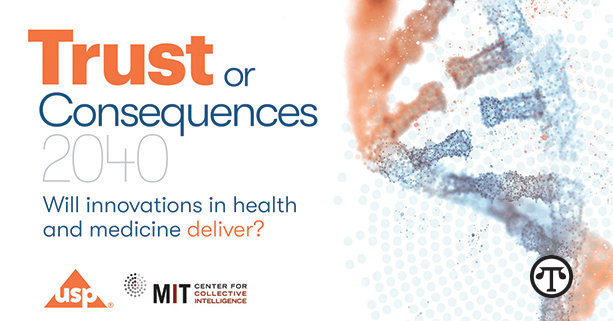As World Faces Health Crises, New Report Finds Trust Is Vital

(NAPSI)—Recently, health experts gathered online to forecast the future of medicine. One theme: the increasing frequency of global crises.
Now, COVID-19 has brought this hypothetical threat to life, and a report by the U.S. Pharmacopeia (USP), an independent, nonprofit, scientific organization dedicated to improving public health through public standards and related programs that help ensure the quality, safety and benefit of medicines and foods, and the MIT Center for Collective Intelligence can help. Called “Trust or Consequences 2040: Will Innovations in Health and Medicine Deliver?” identifies what may happen in the future and explores the role that trust will play in helping people live longer and healthier. It identifies likely drivers of change, such as big data, artificial intelligence (AI), gene editing, risks to health systems and medicine supply chains and opportunities to improve global health. Four scenarios surfaced:
Scaling the tried and true: Rolling crises spur effective global collaboration to address health concerns. Medical advances based on big data and AI are implemented gradually. The focus is on baseline healthcare for all.
Dangerous uncertainty: Problems with big data and AI lead to devastating healthcare failures. Unequal access to innovation means only the rich receive advanced treatments; people turn to folk medicines, science-based medicine is questioned.
A world of difference: The success of big data and AI in healthcare leads to rapid advances in personalized medicine and prevention. Not everyone can access this and disparities between and within countries perpetuate a “haves” versus “have nots” dynamic.
Solving tomorrow’s problems: Smart innovation is widely distributed. Big data and AI create inexpensive diagnostic tools. Diseases become more predictable and healthcare emphasizes prevention. New treatments and technological advances curb costs.
The report also suggests how public quality standards for medical products could help promote trust in health and medicine in the future—as they have for 200 years.
“Many of the challenging issues we face in healthcare are recurring and persistent. ‘Trust or Consequences 2040’ points out that we must plan for the future we want, or we risk failure and an erosion of trust. Standards offer a proven approach to building trust and ensuring as many people as possible benefit from promising innovations in health and medicine,” said Ronald T. Piervincenzi, Ph.D., CEO of USP.
Read the report at www.usp.org/trustorconsequences. Share your opinion on social media using #TrustTomorrow.

““Many of the challenging issues in healthcare are recurring and persistent. We must plan for the future we want, ensuring as many people as possible benefit from promising innovations in health and medicine,” said Dr. Ronald Piervincenzi, CEO of USP.https://bit.ly/2X3Ev6n”
